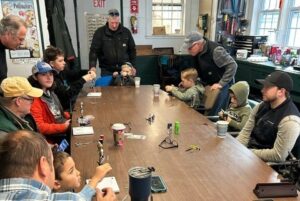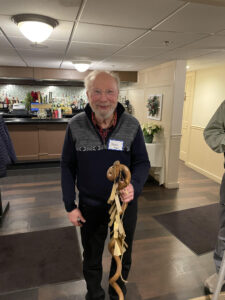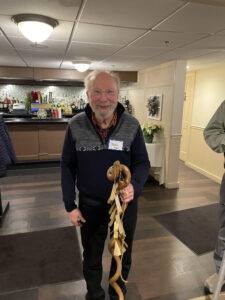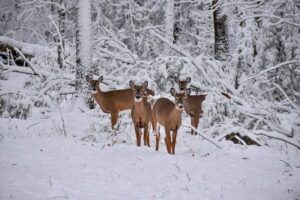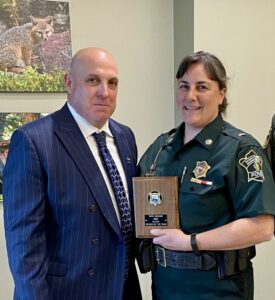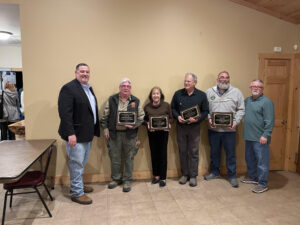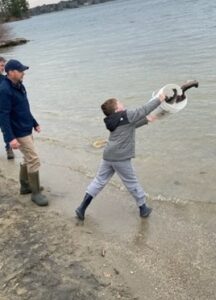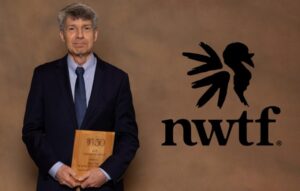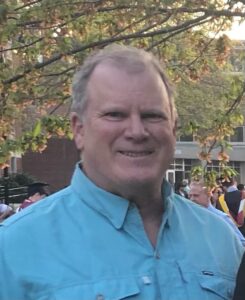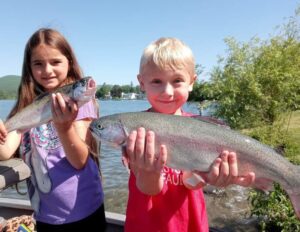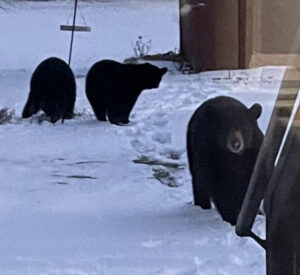The year 2023 is now history. So, what were some of the major articles this column covered last year?
Well, things started off on a sad note. In January we learned that local flyfishing legend Fred Moran of Adams passed beyond the riverbend.
More than 700 lbs of venison were distributed and provided meals for people throughout the state in 2022.
A total of 223 black bears were taken during the combined 2022 bear hunting seasons. This was the second highest in the last 5 years and the 6th highest overall. Some 79 bears were taken in Berkshire County. The 2022 deer harvest set a record at 5,853 deer. That harvest highlighted the growing deer abundance statewide and increased access to permits. Some 3,067 turkeys were harvested statewide in 2022, 2,837 in the spring hunt and 230 in the fall hunt.
There was a 3-way tie in the MassWildlife Youth Catch & Keep Angler of the Year 2022, Carter Flagg of Gill, and Logan Middlebrook and Gabriel Christman of Pittsfield. Logan caught the gold pin brown trout weighing 3 lbs. 6 oz out of Onota Lake and Gabriel caught the gold pin 3 lbs. 5 oz rainbow trout out of Stockbridge Bowl. Gabriel also caught a gold pin white perch weighing 1 lb. 4 oz out of Pontoosuc Lake.
Other gold pin fish that were caught out of Berkshire waters last year were:
- Adult Catch & Keep Category – A 3 lbs. 5 oz brook trout was caught out of Goose Pond by Allan Armstrong of Lee.
- Catch & Release Category – Two 44-inch northern pike were caught out of Onota Lake. One was caught by Seth Davis of Oxbridge and one caught by Jake Burke of Pittsfield. Another gold pin fish caught out of Onota was a 23.25- inch white catfish which was caught by Jason Wingrove of Bernardston.
Four area outdoor sportspeople/conservationists received prestigious awards at the Silvio O. Conte Awards Banquet which was sponsored by the Berkshire County League of Sportsmen (BCLA):
- Stephen Sears of Dalton received the Sportsman of the Year Award.
- The late Fred Moran received the Lifetime Achievement Award posthumously.
- Joel Miraglia of Ashfield received the Sportsmen’s Appreciation Award.
- Eric Dupont of Lee received the John Zuber Award for all that he does for the youth programs at the Lee Sportsmen’s Association.
MassWildlife submitted comments to the Secretary of the Executive Office of Environmental and Energy Affairs and MA Environmental Policy Act Office regarding a proposed Pontoosuc Lake drawdown. MassWildlife’s position is that it alters and causes harm to biological resources without substantive justification or full consideration of alternative approaches with less impact to the biological resources.
Governor Maura Healey made a campaign promise to pause logging on state-owned forest land
In March 23, Dan Aitken of Pittsfield caught a 16 lbs 14 oz tiger muskie that measured 45 inches. Unbelievably, Dan had caught an even heavier fish, a Northern Pike, out of Onota Lake just the week before on March 17. That fish weighed 22 lbs 5 oz and measured 43 inches long.
Local fly fisherman Marc Hoechstetter wrote an article about his experiences fishing the Hideaway Pool on the Deerfield River.
Beginning in 2023 two new fish species (Fallfish and White Sucker) were included in the MA Freshwater Sportfish Awards Program.
In May we documented the tale of two youth turkey hunters 13-year old Hunter Lawson of Williamstown and 17-year old Matthew Melito, of Adams. Both got two turkeys on their first day ever of turkey hunting.
In May, Tom O’Shea was appointed Commissioner of the MA Department of Fish & Game replacing outgoing Commissioner Ron Amidon.
MassWildlife added 125 acres in Cummington adjacent to Route 9. They also partnered with Berkshire Natural Resource Council, DCR, and the Department of Conservation Services to protect more than 750 acres in the towns of Tyringham and Monterey.
A Commemorative plaque was dedicated…. after 49 years. Appreciation was shown for a land donation which was made to the Town of Lenox in 1974 by the late Robert and Olga Weiss of Lenox
Governor Healey’s office announced $500,000 state grants to five coalitions and four individual non-profit watershed organizations across the state to support monitoring water quality. Three local organizations received them, The Housatonic Valley Association – $48,605, The Deerfield River Watershed Chapter of Trout Unlimited – $26,007 and The Farmington River Watershed Association – $13,378.
“An unforgettable Opening Day on the River.” Bill Hollister, formerly of Pittsfield, narrated how he helped save a man from drowning in the West Branch of the Housatonic River in 1950.
MassWildlife led a cleanup of the George Darey Wildlife Management Area as well as certain areas along Roaring Brook Road in Lenox.
Based on studies, we learned that most brown trout in the Deerfield River are wild, not stocked
Changes in goose hunting season, one being the extension of its season date which would run from January 1 through February 15.
In June, the Pediatric Palliative Care Program, part of Hospice Care in the Berkshire, enjoyed the BCLS sponsored Youth Outreach Derby on Reynolds Pond in Cheshire.
The 2023 Harry A. Bateman Memorial Jimmy Fund Fishing Derby drew about 300 fishermen and raised over $10,000 for the fight against cancer.
In June there was an article about Paul Knauth (Hinsdale) and me chronicling a wonderful flyfishing trip to the Catskills and epic battles fought with large trout. None were landed.
Naturewatch columnist Thom Smith retired.
Wildlife officials wondered whether we could reverse the trend of dwindling hunting and fishing participants.
In recognition of his 35 years of dedicated and effective conservation work, an asteroid was named after Dr. Thomas W. French, the founding leader and former Assistant Director of MassWildlife’s Natural Heritage and Endangered Species Program (NHESP).
Local recipients of the Culvert Replacement Municipal Assistance (CRMA) Grant Program were: Egremont: $48,811 for Karner Brook Culvert Replacement, Richmond: $55,200 for Sleepy Hollow Road Culvert Replacement, Great Barrington: $55,933 for Housatonic River Tributary Culvert Replacement, Berkshire Clean, Cold, Connected Restoration Partnership, Housatonic Valley Association, awarded $199,899.
Environmental Police Officer Lt. Tara Carlow received the Outstanding Officer of The Year Award in Conservation Law Enforcement and Public Safety.
New proposed gun control law (HD.4420) drew fire from hunters and legal shooting enthusiasts.
Alice Christman of Pittsfield caught a 42 1/2 inch pike weighing just short of 14lbs.
It was a great hunting year for young Hunter Lawson. In addition to the two turkeys that he got earlier in the year, he also got a black bear
In October a column heading was “Back to Battle on flyfishing trip to the Catskill. This scribe’s attempt to catch a big brown trout that defeated him in June. After it cleaned my clock again, it took on the name of Iron Mike. (Named after Heavyweight Champion boxer Mike Tyson who trained in the Catskills).
In October we learned about local MassWildlife firefighter Jacob Morris-Siegel’s trip to Montana to fight the wildfires.
here was an article about a new turkey license plate that is on the horizon.
Sportsmen and women were recognized by New England governors as America’s true conservationists.
The 2023 MA paraplegic hunt harvested 10 deer, only 1 in the Berkshires
In November, four instructors from MassWildlife conducted a Field Day for its Basic Hunter Education Course at the Stationery Factory in Dalton. 49 students passed the course.
In November over 30 individuals participated in a fly tying/fly fishing event at the Berkshire National Fish Hatchery
In December, the Healey-Driscoll Administration announced an investment of $25 million to remove eight aging dams in Central and Western Massachusetts, including the abandoned high-hazard Bel Air Dam in Pittsfield
Charles Wohl of Lenox was
awarded Trout Unlimited Crooked Staff Award.
In December, local photographer Mark Thorne reported that T98, the 21 ½ year old female bald eagle, went missing.
Many thanks for reading this column last year. I look forward to continuing writing about our woods and waters in the new year.

